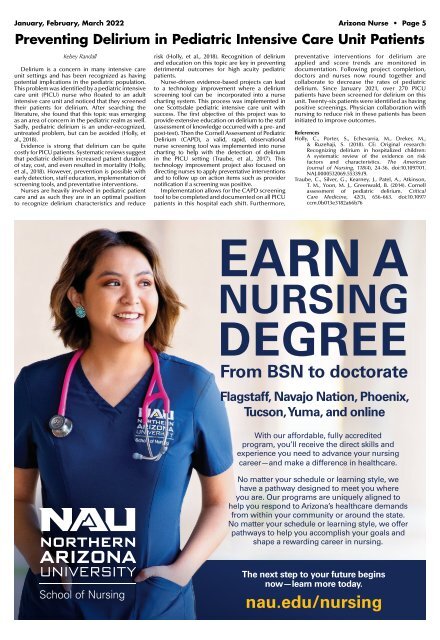Arizona Nurse - January 2022
You also want an ePaper? Increase the reach of your titles
YUMPU automatically turns print PDFs into web optimized ePapers that Google loves.
<strong>January</strong>, February, March <strong>2022</strong> <strong>Arizona</strong> <strong>Nurse</strong> • Page 5<br />
Preventing Delirium in Pediatric Intensive Care Unit Patients<br />
Kelsey Randall<br />
Delirium is a concern in many intensive care<br />
unit settings and has been recognized as having<br />
potential implications in the pediatric population.<br />
This problem was identified by a pediatric intensive<br />
care unit (PICU) nurse who floated to an adult<br />
intensive care unit and noticed that they screened<br />
their patients for delirium. After searching the<br />
literature, she found that this topic was emerging<br />
as an area of concern in the pediatric realm as well.<br />
Sadly, pediatric delirium is an under-recognized,<br />
untreated problem, but can be avoided (Holly, et<br />
al., 2018).<br />
Evidence is strong that delirium can be quite<br />
costly for PICU patients. Systematic reviews suggest<br />
that pediatric delirium increased patient duration<br />
of stay, cost, and even resulted in mortality (Holly,<br />
et al., 2018). However, prevention is possible with<br />
early detection, staff education, implementation of<br />
screening tools, and preventative interventions.<br />
<strong>Nurse</strong>s are heavily involved in pediatric patient<br />
care and as such they are in an optimal position<br />
to recognize delirium characteristics and reduce<br />
risk (Holly, et al., 2018). Recognition of delirium<br />
and education on this topic are key in preventing<br />
detrimental outcomes for high acuity pediatric<br />
patients.<br />
<strong>Nurse</strong>-driven evidence-based projects can lead<br />
to a technology improvement where a delirium<br />
screening tool can be incorporated into a nurse<br />
charting system. This process was implemented in<br />
one Scottsdale pediatric intensive care unit with<br />
success. The first objective of this project was to<br />
provide extensive education on delirium to the staff<br />
(assessment of knowledge occurred with a pre- and<br />
post-test). Then the Cornell Assessment of Pediatric<br />
Delirium (CAPD), a valid, rapid, observational<br />
nurse screening tool was implemented into nurse<br />
charting to help with the detection of delirium<br />
in the PICU setting (Traube, et al., 2017). This<br />
technology improvement project also focused on<br />
directing nurses to apply preventative interventions<br />
and to follow up on action items such as provider<br />
notification if a screening was positive.<br />
Implementation allows for the CAPD screening<br />
tool to be completed and documented on all PICU<br />
patients in this hospital each shift. Furthermore,<br />
preventative interventions for delirium are<br />
applied and score trends are monitored in<br />
documentation. Following project completion,<br />
doctors and nurses now round together and<br />
collaborate to decrease the rates of pediatric<br />
delirium. Since <strong>January</strong> 2021, over 270 PICU<br />
patients have been screened for delirium on this<br />
unit. Twenty-six patients were identified as having<br />
positive screenings. Physician collaboration with<br />
nursing to reduce risk in these patients has been<br />
initiated to improve outcomes.<br />
References<br />
Holly, C., Porter, S., Echevarria, M., Dreker, M.,<br />
& Ruzehaji, S. (2018). CE: Original research:<br />
Recognizing delirium in hospitalized children:<br />
A systematic review of the evidence on risk<br />
factors and characteristics. The American<br />
Journal of Nursing, 118(4), 24-36. doi:10.1097/01.<br />
NAJ.0000532069.55339.f9.<br />
Traube, C., Silver, G., Kearney, J., Patel, A., Atkinson,<br />
T. M., Yoon, M. J., Greenwald, B. (2014). Cornell<br />
assessment of pediatric delirium. Critical<br />
Care Medicine, 42(3), 656-663. doi:10.1097/<br />
ccm.0b013e3182a66b76<br />
EARN A<br />
NURSING<br />
DEGREE<br />
From BSN to doctorate<br />
Flagstaff, Navajo Nation, Phoenix,<br />
Tucson, Yuma, and online<br />
With our affordable, fully accredited<br />
program, you’ll receive the direct skills and<br />
experience you need to advance your nursing<br />
career—and make a difference in healthcare.<br />
No matter your schedule or learning style, we<br />
have a pathway designed to meet you where<br />
you are. Our programs are uniquely aligned to<br />
help you respond to <strong>Arizona</strong>’s healthcare demands<br />
from within your community or around the state.<br />
No matter your schedule or learning style, we offer<br />
pathways to help you accomplish your goals and<br />
shape a rewarding career in nursing.<br />
The next step to your future begins<br />
now—learn more today.<br />
nau.edu/nursing

















